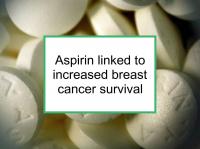Aspirin use is associated with reduced breast cancer risk, according to some studies. Pre-diagnostic aspirin use does not appear to influence recurrence. However, aspirin use after diagnosis has been linked to lower risk of relapse. Now a new study has reported postdiagnosis aspirin use is associated with reduced breast cancer-specific mortality.
Aspirin and breast cancer
Regular aspirin use reduces breast cancer risk in part by reducing inflammation and inhibiting COX-2 overexpression (NSAIDs like aspirin act by blocking the production of prostaglandins, of which COX-2 is one). Aspirin has been reported to inhibit aromatase activity (in which androgens are converted to estrogens in the body). Aspirin appears to inhibit breast cancer metastasis, although the mechanism is unclear. In fact, aspirin appears to be more effective in preventing breast cancer's spread than in preventing breast cancer itself.
Aspirin appears to be the best choice for short-term relief from pain and inflammation for breast cancer survivors compared to other commonly available pain killers. Aspirin appears to enhance the effectiveness of tamoxifen. However, aspirin should not be used during chemotherapy since it might interfere with its treatment effects. Note that regular aspirin use has potentially serious side effects, including gastrointestinal bleeding, hemorrhagic stroke, and age-related macular degeneration.
Food sources of salicylic acid
Aspirin is metabolized into salicylic acid in the body. A wide variety of foods and spices contain salicylic acid, although concentrations typically are low. Drying concentrates the salicylic acid levels of foods. Below are foods that are good sources of salicylic acid, in addition to having been linked to reduced breast cancer risk:The bark of the white willow tree contains salicin, which is similar to aspirin.
Latest research: Significant reduction in death among aspirin users
The study referenced at the beginning of this news story was designed to investigate the influence of aspirin use on breast cancer survival. The authors conducted the study by linking cancer registry data with prescription and death records in Tayside, Scotland. The study included 4,627 postmenopausal women diagnosed with breast cancer between 1998 and 2008. The women, who had median age 62 at diagnosis, were followed until February 2010.
A total of 1,802 (39%) of the women died during follow up, of whom 815 (18%) died of breast cancer. A total of 1,035 (22%) of the patients were prescribed aspirin after breast cancer diagnosis, presumably to treat or prevent cardiovascular disease. Prescribed aspirin use was found to be associated with a 47% reduced risk of death from all causes and a 58% lower risk of breast cancer-specific death. Results were adjusted for socioeconomic status, age, estrogen receptor status, tumor stage and grade, treatment (surgery, radiotherapy, chemotherapy, tamoxifen and aromatase inhibitor treatment), and prediagnosis aspirin use. The authors conclude that aspirin use after diagnosis may reduce both all-cause and breast cancer-specific mortality. Trials are underway to determine a causal relationship and which subgroups of breast cancer patients most benefit from aspirin.
Please see our article on aspirin for more information.
